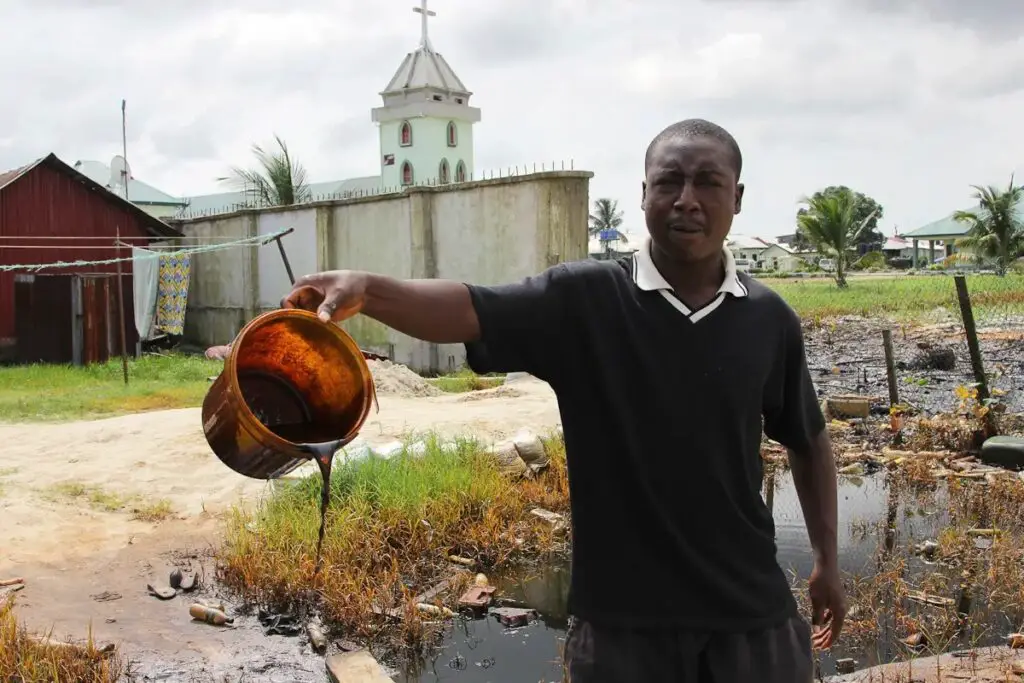- Shell Nigeria is selling off major stakes in the west African country.
- Critics blame the government of Nigeria for allowing the sell at a time the oil giant is facing suits on oil spills.
- Activists want Shell Nigeria to be held responsible for alleged decades of oil spills.
Shell Nigeria has sold off major stakes in the Western African country, sparking chatter that the move could be just a ploy to escape oil spill charges in the country. On the other hand, there is an argument that the Shell move is just a numbers game, a move to cut losses in troubled onshore Nigeria stakes in favor of its offshore investments.
Which of the two is true? Is Shell shedding off investments in on-land fossil fuels to redirect its resources to less-hassle offshore exploration, or is the British oil giant simply running away from oil spill charges?
Media has reported the development in Shell Nigeria, stating, “increasing challenges with pipeline sabotage, lawsuits, and environmental damage claims against subsidiary Shell Nigeria, may be some of the reasons for it to conclude nearly a century of operations in the Nigerian onshore oil and gas sectors.”
Consortium of local firms buying off Shell Nigeria
“It does bring to question, however, the fact that even though the British energy giant did in fact pioneer oil exploration and later gas in Nigeria since the 1930s, the company has surprisingly agreed to sell its subsidiary, Shell Nigeria, to a consortium of companies for a not so impressive $2.4 billion.”
What most people don’t know is that the sell is not news; since 2021, Shell has been looking to sell its onshore Nigerian oil and gas business and remain active in its offshore sector, for now at least. What is news is the fact that the government in Abuja has approved the sell-off.
Amnesty International called on the Nigerian government to ensure that “Shell’s planned sale of its operations in the Niger Delta does not lead to a further deterioration in human rights in a region blighted by decades of oil pollution.”
While activists cry foul play alleging a move to avoid paying for decades of pollution, on its part, the energy giant is sweeping all the dirty talk under a rug labeled ‘restructuring.’
Zoe Yujnovich, Shell’s Integrated Gas and Upstream Director, was adamant in his public statement, that the move was legitimate and a long-time existing plan to restructure the company’s operations.
Shell Nigeria fighting pollution charges in oil-rich Niger Delta
Despite the bureaucratic statement, pollution charges in the oil-rich Niger Delta have long haunted the Shell Petroleum Development Company (SPDC). With the long-standing pollution allegations that could very well cost the oil giant lump sums, pocketing the $2.4 billion and leaving the environment concerns on the new owners sounds plausible.
“They are running away from the atrocities and also the damages they have caused the people and the environment,” activists maintain.
Kentebe Ebiarado from a popular Nigerian national environmental and human rights advocacy NGO, the Environmental Rights Action, has been very vocal on the matter claiming; “…they are trying to run away from it in a way of evading to pay a compensation or evading justice from the community.”
Over the years, the oil spills have led to several high-profile the most recent been the 2021 ruling by a Dutch court that found Shell guilty of polluting the southern Niger Delta region and ordered it to pay compensation of $111 million for oil spills in the region.
Then there is the ruling past last year by Nigeria’s Bayelsa State Oil and Environmental Commission which found Shell (and another company) guilty of oil spills in Bayelsa state and ordered the oil giant to a whopping $12 billion for the cleanup of oil spills.
With the sell-off, Shell has effectively divested its stakes in the onshore oil stakes and is thus no longer responsible for damages caused by the spills during its exploration tenure. Not all are finding the move palatable, in fact most find it a bitter pill to swallow.
Here is what one local of the region had to say about the Shell sell and subsequent evasion of oil spill responsibilities; “Divestment or no divestment, selling of assets or not selling of assets is none of my business. The issue is Shell has a question to answer to the people of Niger Delta.”
The Niger Delta peasant cries; “Shell has the responsibility to restore back our land. Our farmlands have been damaged for over 56 years. Shell has damaged our environment. We are living in abject poverty in the midst of plenty.”
So what happened, why did the government of Nigeria allow the sell to take place despite these oil spill cases? Previously, Nigeria has refused similar moves by another oil giant, the US multinational ExxonMobil Corporation.
Read also: Can Nigeria oil and gas firms succeed where Shell faced setbacks?
ExxonMobil exit plan hinged on oil spill, too
ExxonMobil had also tried to sell off its stakes in the wake of mounting oil spill charges but it couldn’t, the government refused. To date, that sell is still in a deadlock two years after it was proposed.
“Optimism that President Bola Tinubu’s arrival in office in May would expedite deals in Africa’s biggest oil producer is starting to dissipate. Exxon Mobil Corp. agreed to sell its shallow-water oil assets to Seplat Energy Plc almost two years ago, but the transaction has yet to complete amid objections from state-owned Nigerian National Petroleum Co.” reports Bloomberg.
Given the tight spot that ExxonMobil is in, Shell has in fact wiggled its way out of a very tight spot, not surprising that it was able to lubricate friction points in the deal, it is after all, a multinational oil giant.
